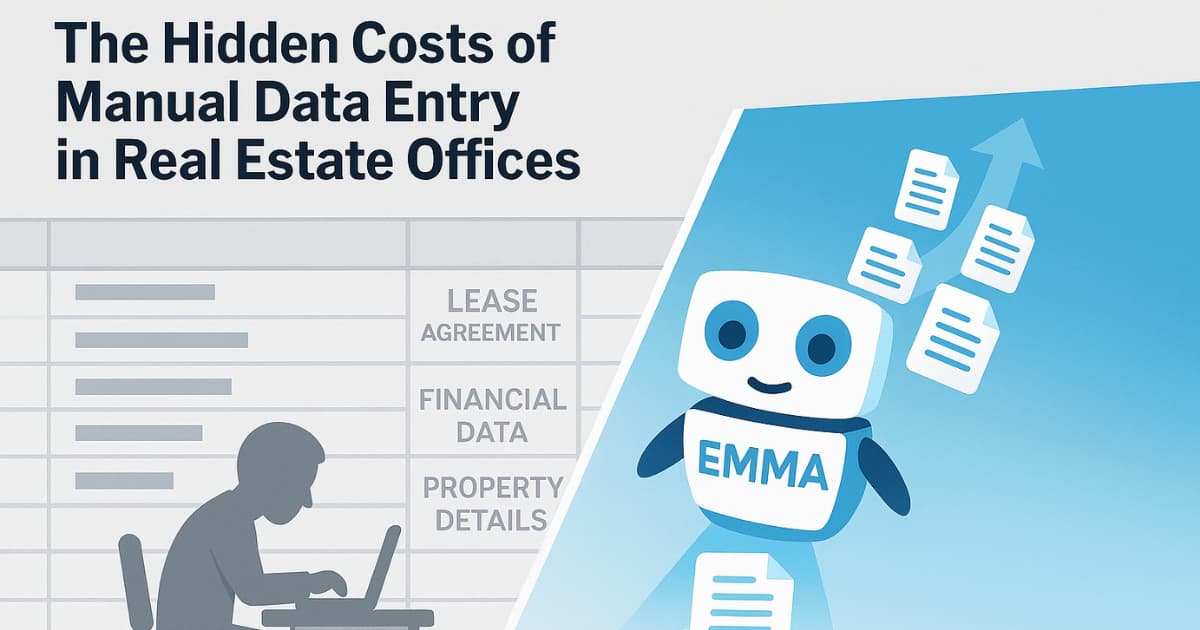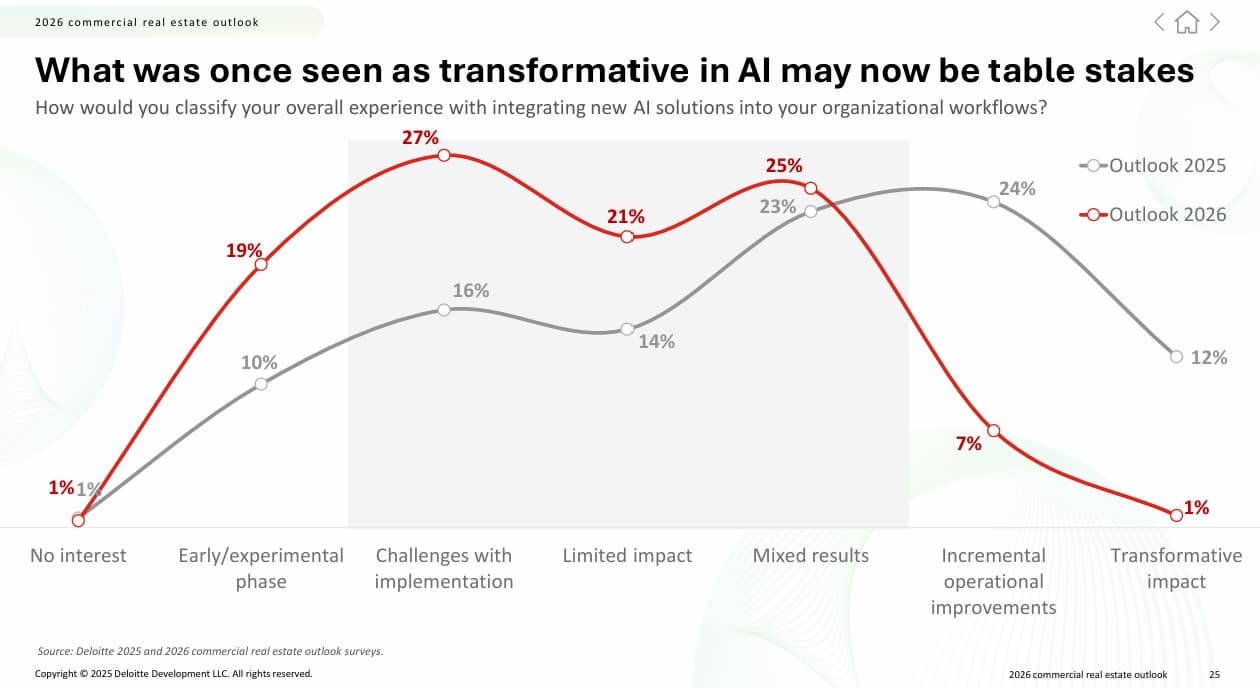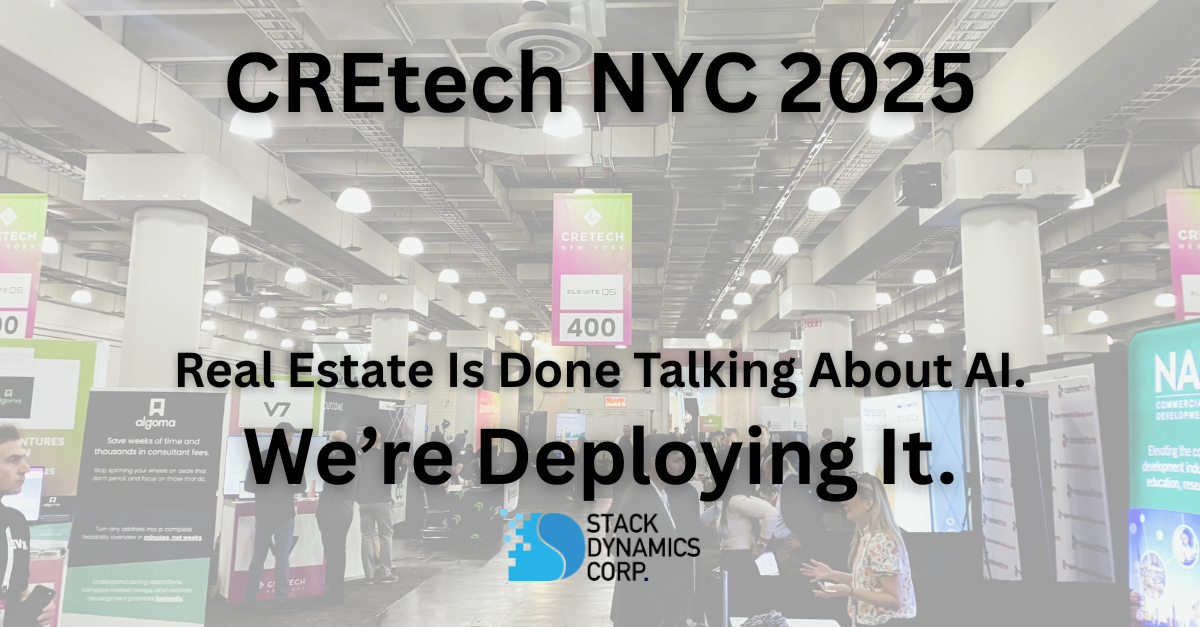In the dynamic world of real estate, efficiency is paramount. Yet, walk into countless real estate offices today, and you’ll likely witness a familiar scene: teams engrossed in the painstaking process of manual data entry. Updated clauses in lease agreements are typed line by line, intricate financial data is painstakingly keyed into spreadsheets, and crucial property details are copied multiple times from one system to another. This widespread practice, often perceived as an inexpensive solution – “just hire a couple of admin staff and get it done” – is, in reality, one of the most significant, yet often overlooked, drains on profitability and operational agility within the industry.
The quiet truth is that manual data entry is a costly habit, silently eroding the bottom line. Studies consistently highlight that data entry errors alone cost businesses billions of dollars annually. For real estate companies, where transactions involve high-value contracts, sensitive tenant information, and recurring billing cycles, even a seemingly minor mistake can cascade into severe consequences.
We’re talking about compliance risks, significant payment delays, damaged vendor trust, and ultimately, a substantial impact on revenue. It’s time to pull back the curtain and expose the true financial and operational burden of outdated processes, and then explore how AI workflow automation offers a transformative solution, redefining efficiency for modern real estate enterprises.
Why Do So Many Real Estate Firms Still Cling to Manual Processes?
The inertia towards change is a powerful force, especially in an industry as deeply rooted in tradition as real estate. While the detrimental effects of manual data entry are undeniable, several factors contribute to its persistent presence:
- “This is how we’ve always done it.”
- The Legacy Workflow Trap: Entrenched legacy workflows are notoriously difficult to dismantle. Companies often find comfort in the familiar, even when it’s inefficient, leading to resistance to change and a reluctance to explore innovative solutions.
- The Awareness Gap:
- Misconceptions About Automation Accessibility: A significant barrier is the lack of awareness regarding the accessibility and affordability of modern AI workflow automation tools. Many real estate professionals may believe that automation is complex, expensive, or only suitable for large enterprises.
- The Cost Myth:
- Underestimating Automation ROI: The perceived cost of hiring an additional staff member for data entry often appears lower than investing in technology. However, this perspective overlooks the compounding hidden costs that begin to accumulate almost immediately. The initial investment in AI workflow automation delivers a far superior automation ROI over time.
The Real Price Tag of Manual Data Entry for Businesses: Unveiling the Hidden Costs
The notion that manual data entry is a cost-effective approach is a dangerous illusion. The true expense extends far beyond salaries, manifesting in a multitude of ways that silently bleed resources from a real estate business.
1. The Escalating Labor Costs of Manual Data Entry
As your real estate portfolio expands, so does the relentless demand for manual data entry personnel. This isn’t just about initial salaries; it encompasses a much broader spectrum of expenditures:
- Salaries and Benefits: The direct cost of wages and benefits for a growing data entry team quickly becomes a substantial overhead.
- Training and Onboarding: Each new hire requires time and resources for training.
- Overtime and Temporary Staffing: Peak periods often necessitate costly overtime or temporary staff, further inflating labor costs of manual data entry.
- Opportunity Cost: Every dollar spent on repetitive data entry tasks is a dollar not invested in growth initiatives.
2. Data Entry Errors and Their Business Impact: A Cascade of Consequences
The human element, while indispensable for strategic thinking, is inherently prone to error in repetitive tasks. Even a single misplaced digit can trigger a catastrophic chain of events:
- Financial Losses: Incorrect billing or miscalculated commissions can directly impact profitability.
- Compliance Penalties: Errors in tenant records or regulatory filings can lead to hefty fines, tarnishing reputation.
- Customer Dissatisfaction and Churn: Mistakes can lead to frustration, unhappy vendors, lost trust, and ultimately, tenant churn.
- Reputational Damage: News of errors spreads quickly, severely damaging a firm’s brand image. The data entry errors and their business impact can be long-lasting.
3. Productivity Loss from Manual Data Entry: Squandered Potential
Your highly skilled property managers and agents are hired for their expertise. Yet, a significant portion of their valuable time is often siphoned off into mundane, repetitive tasks associated with manual data entry.
- Time Wasted on Low-Value Tasks: Instead of focusing on client acquisition, employees spend hours checking spreadsheets or updating CRMs. This represents a colossal productivity loss from manual data entry.
- Delayed Operations: The slow pace of manual processing means critical business operations are often delayed.
- Employee Frustration and Burnout: Repetitive tasks contribute to dissatisfaction and higher turnover.
4. How Manual Data Entry Delays Cash Flow: The Financial Bottleneck
In real estate, predictable and timely cash flow is the lifeblood of the business. When invoicing, rent reminders, and payment processing are reliant on manual data entry, the entire financial cycle slows down significantly:
- Slowed Invoicing and Payments: Manually generated invoices mean a longer lead time from service delivery to payment request, directly impacting how manual data entry delays cash flow.
- Increased Late Payments: Delayed reminders or errors in billing can lead to more late payments.
- Missed Early-Payment Discounts: Manual processing can prevent taking advantage of early-payment discounts.
- Stretched Working Capital: The cumulative effect is a perpetually stretched working capital.
5. Compliance Risks in Manual Data Entry: Navigating the Regulatory Minefield
Real estate firms handle an immense volume of sensitive financial and personal data daily. Manual data entry introduces significant vulnerabilities and amplifies compliance risks in manual data entry:
- GDPR/CCPA Fines: Accidental disclosure or improper handling of personal data due to manual errors can result in severe penalties.
- Late-Payment Penalties: Inaccurate financial record-keeping can lead to errors in official filings.
- Reputational Damage from Security Lapses: A manual error leading to a data breach can cause irreparable damage.
How StackDC AI Workflow Automation Addresses Manual Data Entry Challenges:
Manual data entry continues to be one of the most time-consuming and error-prone aspects of real estate operations. StackDC’s AI workflow automation suite Unity provides a practical approach to streamline these processes. Rather than replacing human expertise, it supports teams by reducing repetitive work, minimizing errors, and ensuring data moves efficiently through the system.
1. AI Workflow Automation Reduces Labor Dependency: Supporting Scalable Operations
Manual data entry often limits how fast a business can grow. With StackDC’s AI workflow automation solutions, firms can manage larger data volumes without proportionally increasing staff.
- No-Code Workflows Enable Scale: Our no-code workflows can adapt as data volumes grow, helping reduce dependency on manual processing.
- Better Use of Talent: Employees who previously spent time on repetitive data entry can shift focus to areas that need judgment, decision-making, and client engagement.
2. StackDC’s AI Automation Solutions Improve Accuracy and Reduce Errors: Consistency in Data
Human error is an unavoidable part of manual entry. StackDC’s AI automation helps reduce these risks and supports more reliable outcomes.
- NLP + ML for Smarter Data Handling: Natural Language Processing (NLP) and Machine Learning (ML) assist in extracting and validating information from varied sources, leading to cleaner input at the point of capture.
- Automated Verification: The system cross-checks information and flags inconsistencies for review, reducing the likelihood of unnoticed mistakes.
3. Boost Productivity with AI Workflow Automation: Freeing Up Time
Automation helps teams focus on higher-value tasks rather than routine typing and verification.
- Shifting Focus to Strategic Work: Property managers can dedicate more time to client and tenant needs, while administrative teams focus on service improvements.
- Faster Processing: AI can handle large volumes of repetitive work in less time, enabling quicker turnaround on data-driven tasks.
4. StackDC’s Unity AI Automation Workflows Support Cash Collection: Improving Efficiency in Revenue Cycles
Delays in billing and collections impact business growth. StackDC’s suite of automation solutions helps streamline parts of this process.
- Invoice and Payment Processing: Automated workflows ensure invoices are generated and shared quickly, reducing administrative delays.
- Reminders and Follow-Ups: Automated reminders help keep payments on track and improve cash flow predictability.
Our AI Workflow Automation Use Cases Across Real Estate
The versatility of AI workflow automation makes it applicable across virtually every department:
- Finance:
- AP/AR Automation for Financial Health: Automated invoicing and AP/AR streamline financial processes.
- Property Management:
- Simplifying Tenant Workflows: Automates repetitive tasks including, onboarding, and maintenance request management.
- Asset Management:
- Automated Lease Abstraction: Document AI OCR ingests and processes leasing documents.
- HR:
- Streamlining Employee Onboarding: Automates paperwork and data integration for new hires.
The Unmistakable ROI of our AI Workflow Automation vs Manual Data Entry
For real estate companies, the ROI of our AI workflow automation vs manual data entry is transformative. Firms that embrace this shift consistently report significant, measurable gains:
- Substantial Time Savings: Employees gain back hours per week, every week.
- Direct Cost Reductions: The need for additional administrative hires is drastically reduced.
- Accelerated Revenue Impact: Faster billing and collections lead to a healthier, more predictable revenue stream.
- Competitive Edge: Superior efficiency, accuracy, and compliance provide a distinct competitive edge.
- Reduced Risk Profile: Our AI automation mitigates financial, legal, and reputational risks.
How to Replace Manual Data Entry with StackDC’s AI Workflow Automation Solutions: Your Automation Blueprint
Embarking on an automation journey doesn’t have to be overwhelming. A strategic, phased approach ensures a smooth and successful transition:
- Audit Your Current Processes: Map out existing workflows involving data entry.
- Prioritize High-Volume, High-Reputation Workflows: Focus on consequential processes with high volume for maximum impact and quicker automation ROI.
- Implement Unity, StackDC’s AI Workflow Automation Platform: Ours is a robust, user-friendly platform with intuitive no-code AI workflows.
- Pilot and Scale Gradually: Start with a pilot program, gather feedback, and then scale across departments.
Conclusion: Manual Data Entry vs StackDC AI Workflow Automation – A Clear Choice
The comparison between manual data entry vs Document AI with StackDC’s Unity AI workflow automation suite reveals a stark reality. While manual processes might appear affordable on the surface, they are, in fact, a silent, pervasive drain on profitability, a significant drag on productivity, and a continuous source of compliance risk for real estate firms.
Our AI workflow automation doesn’t just plug these costly leaks; it fundamentally transforms operations. By eliminating human error, accelerating financial cycles, and freeing up your most valuable asset – your human talent – it empowers your team to focus on strategic growth, client relationships, and innovation. The choice is clear: embrace the future of efficient, intelligent real estate operations or remain tethered to outdated practices that erode your competitive edge.
StackDC’s AI Workflow Automation platform, powered by Unity Document AI OCR, core no-code workflow builders, Unity IQ data visualization and Niva AI agentic orchestration is specifically designed to eliminate manual data entry in real estate. From automating the extraction of critical data from lease agreements and property records with Unity Document AI OCR to accelerating AP/AR cycles and streamlining tenant management through customizable no-code workflows, StackDC equips real estate enterprises with scalable, compliant, and error-free automation that directly improves cash flow and client satisfaction.
Ready to cut the ties with manual data entry and accelerate your real estate workflows?
Discover how StackDC can help you implement powerful, AI-powered no-code automation solutions tailored for the real estate industry, propelling your business into a new era of efficiency and profitability. Explore our case studies to learn how other real estate industry leaders have leveraged our products to reduce errors and save money. If you want to learn how automation can help cut manual data entry, book a demo today.





